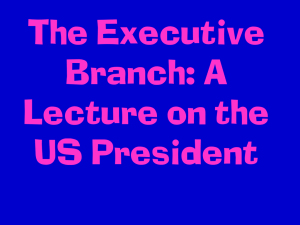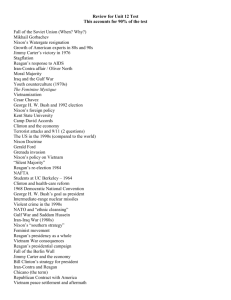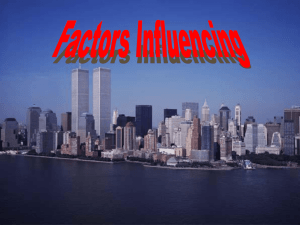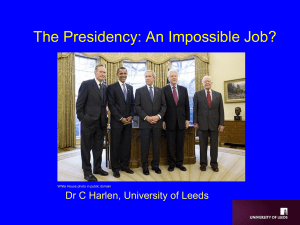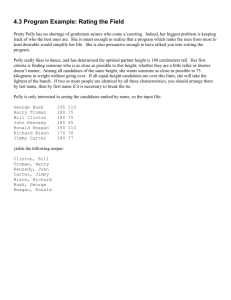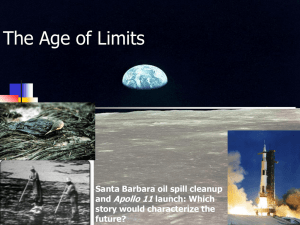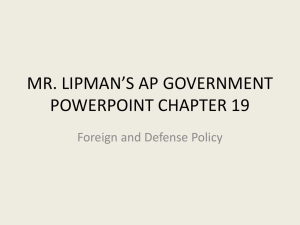Chapter 13
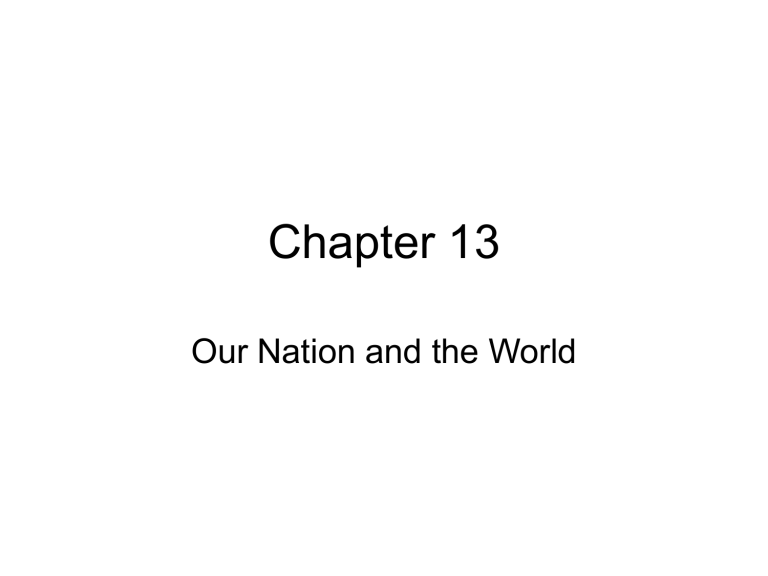
Chapter 13
Our Nation and the World
Lesson 1 The 70’s
• Vocabulary: resign, migrant worker, accord
• Main Ideas: The major events in Nixon’s presidency included his trip to China, the
Middle East oil crisis and Watergate.
• Other minorities worked for equal rights.
• President Carter struggled with inflation at home and encouraged peace in the Middle
East.
Richard Nixon
• Elected President in 1968 (Republican)
• Focused on world events
• Success in China and Soviet Union
• First U.S. President to travel to and deal with China
• Signed nuclear agreement with Soviet Union
Oil Crisis (5 months)
• 1973 War in Middle East
• Egypt and Syria attacked Israel
• U.S. ally with Israel
• Oil countries supported Egypt and Syria so they produced less oil so that U.S. oil prices went up drastically
Supply and demand caused inflation on other products
Watergate
• 1972 Democratic Presidential campaign headquarters in Watergate Hotel
• Nixon’s campaign workers broke into the hotel in D.C. to steal information and were caught
• Nixon claimed he didn’t know about it but evidence proved differently
• Nixon resigned/quit in 1974 instead of being impeached/removed from office
Gerald Ford
• Was Vice President with Nixon and took over as President in 1974
• “Our long national nightmare is over.”
Equal Rights Continues
• Minorities like women, farm workers,
American Indians and other groups worked for equal rights
• Group named NOW worked to pass law
ERA giving equal rights to women (Gloria
Steinem)
• Women in the work force changed from
19% to 57%
Famous First Women
• 1917 Jeanette Rankin of Montana became the 1 st woman elected to U.S. Congress
• 1920-19 th AmendmentWomen’s right to vote
• 1963 Congress passed ERA requiring equal pay on same jobs
• 1976 Military admits women
• 1981 Sandra Day O’Conner becomes 1 st woman appointed to the Supreme Court
Indian Rights Movement
• Indians wanted more control over their reservations
• They also wanted the U.S. government to honor its treaties with them
• Cesar Chevez and Delores Huerta fought for equal rights for migrant workers
Ralph Nadar
• Worked to protect consumer rights
• Helped create laws to improve safety and quality of products purchased by the public
Jimmy Carter
• Voters demanded change after Watergate and inflation so they elected Carter to be
President in 1976
• Dealt with many other countries
• Inflation continued so Carter limited government spending and raised taxes
Camp David Accord
• Carter met with leaders of Egypt and Israel
• Egypt and Israel had been enemies for 30 years but Carter helped them to compromise and sign a peace treaty
• Middle East countries raised price of oil and U.S. prices more than doubled
• Again, the public demanded a change but
Carter continued to work for peace and human rights around the world
Nobel Peace Prize
• Awarded yearly to person that has contributed to world peace
• 2002 Jimmy Carter won the Nobel Peace Prize
Lesson 2 The 80’s
• Reagan becomes President after being an
Hollywood actor
• He had a different view of government – wanting to spend less on govt programs
• “Government is not the solution to our problems; government is the problem.”
• He focused on how to strengthen the economy
Reagan’s Plan
• Use government to help businesses grow so removed many rules on business growth (deregulation)
This also slowed down inflation
Increase military strength (jobs) but caused a large budget deficit/shortage of money
Put Americans back to work!
International Plan
• Cold War ended-Soviet Union command economy had put the USSR in serious financial trouble (no jobs, goods,or housing)
• Couldn’t pay for arms race of Cold War
• Soviet leader Mikhail Gorbachev (1985) built strong relationship with Reagan and
USA
“Tear down that wall”
• 1987 USA and USSR signed a treaty that lowered the number of nuclear weapon each country kept
• Reagan encouraged Gorbachev to tear down the Berlin Wall
• “Gorbechev, tear down that wall”
Bush Era
• 1988 George H. Bush elected President
• Soviet govt and economy became weaker
• Protests occurred in European cities causing communist governed countries to fall apart, including the USSR
• Berlin Wall finally fell reuniting people of
East and West Germany (about 40 years of separation)
Persian Gulf War
• 1990 Saddam Hussein of Iraq invaded
Kuwait to capture their oil fields
• President and the United Nations (UN) formed a coalition to top Iraq
• 1991 U.S. declared war on Iraq-the war lasted about 7 weeks until Iraq left Kuwait
• U.S. used advanced weapons and highly trained soldiers but Hussein remained ruler of Iraq
Fall of Communism
• After 40 years, the Soviet Union and the
U.S. ended their conflict
• As Soviet economy failed, Soviet political strength weakened and collapsed
• Poland broke free of communism first.
Several other republics became independent nations too
Russia
• USSR/Soviet Union changed to Russia
• After may republics separated into independent nations, Russia became its own country
• Other republics formed: Czechslovakia,
Romania, Bosnia, Bulgaria, Lithuania,
Ukraine, Belarus, Croatia, Serbia, Albania,
Kazakhstan, Uzbekistan, etc…
Lesson 3 The 90’s
• Bill Clinton was elected as President. The majority of Americans felt the economy had stopped growing and the country needed a change
• Clinton campaign promise was to focus on the economy
• Madeleine Albright was Clinton’s Secretary of State, the most important job a woman had ever held in govt
Clinton’s Economic Ideas
• Democratic belief that the government should use social programs to help
Americans but deficit from 80’s provided no money for new programs
• Republicans controlled Congress (majority rule)
• So the two branches compromised on small increases of spending on education, health care and public services
Economy Grew
• Low inflation
• Businesses hired more workers
• More people working = more taxes collected
1992 collected about 1 trillion $ in taxes
2000 collected over 2 trillion $ in taxes
By 1998, the budget had a surplus/extra
World Events
• Clinton was a peacemaker in Northern
Ireland, the Middle East, and in the area previously known as Yugoslavia
• Ireland had Protestants and Catholics fighting for decades
• Middle East continued fighting after
Persian Gulf War
• Yugoslavia had ethnic groups battling over forming a new non-communist country
Clinton Impeached?
• Reelected in 1996
• Scandal in his private life which he was accused of lieing in court-even though the
House voted to impeach him, the Senate found him not guilty (House majority was
Republican and Senate majority was
Democrat)
• He was NOT removed from office
Impeachment
• To be impeached means you are accused of a crime.
• Bill of Rights gives you a right to a trial by jury but Clinton’s jury was Congress
• If found guilty, he would be removed
• If not found guilty, he would not be removed
• Andrew Johnson 1968 Nixon and Clinton
Computer Evolution
• 1946 ENIAC was the 1 st computer that weighed 30 tons and filled a large room
• 1977 Desktop Apple II manufactured
• 1981 Laptops manufactured
• 1993 PDA tiny computers manufactured
• High tech jobs were now in high demand
New Technology
• 90’s was the longest period of economic growth in history-stock market reached all time high-people had $ to save, spend and invest
• Investors like Bill Gates developed computer programs to use in homes, classrooms and businesses.
• Marc Andreesen developed the Internet that linked people to the world
Computer Boom
• More people bought and used computers
• Businesses changed to become more high tech
• Products like cell phones were developed
• Computer controlled businesses were quicker, safer and less expensive
Service Jobs
• Economy changes caused jobs changes
• More people found service jobs that provide information and services for others
• Manufacturing jobs decreased
• Some businesses moved their work overseas to save money
• Educated people found ways to be more productive and make more money
Connected World
• Technology, transportation and trade have helped create a world where countries depend on one another
• Transportation and communication improved
• Airports are busier than ever
• International trade increased
• Businesses cooperate around the world to make the products we use today!
Free trade agreement
• Treaty between countries that trade with each other
• Removes taxes and tariffs on products
• The U.S., Mexico and Canada agreed to increase trade among each other
GPS
• Where in the world is Mrs. McKinley?
• Highly detailed maps and images of the world became possible thanks to global positioning systems (GPS)
• GPS uses satellites orbiting Earth to send information to computers on land
• Info includes latitude, longitude, and elevation for every square yard on Earth
Lesson 4 The Millennium
• Millennium means 1000 years
• 2000 election brought one of the biggest parties ever and an unusual presidential election.
• Election was the closest ever-Gore vs.
Bush
Popular vs Electoral
• Two steps of the presidential election:
Popular vote is the vote of the individuals
Electoral vote is the vote of representatives from each state
Candidate that wins the popular vote wins the electoral votes
Candidate has to win the electoral college vote to become President (See p. 465)
Florida
• The total number of votes depended on
Florida-one of the last to report
• Bush won popular vote and electoral vote which allowed him to win the election
• There was debate in some of the votes
(chad) and the public argued Gore won
• Bush’s brother was Governor of Florida
Attack on the Nation
• Terrorism is using violence against ordinary people to achieve a political goal
• September 11, 2001 four U.S. airplanes were hijacked and crashed killing about
3000 innocent people
• Al-Qaeda was a Middle Eastern group that led the attack-leader was Osama bin
Laden
WAR!
• President Bush told America to prepare for war!
• “While the price of freedom and security is high, it is never too high. Whatever it costs to defend our country, we will pay.”
• Attack on Afghanistan (Asia) was first and lasted 3 months
• U.S. defeated govt and military but didn’t capture bin Laden
IRAQ’S Turn
• 2003 Bush focused on removing dictator
Saddam Hussein of Iraq due to his refusal to allow UN inspectors to search for illegal dangerous weapons
• America defeated govt and military and captured Saddam Hussein
• U.S. stayed in Middle East to form new govt in Afghanistan and Iraq
911 Heroes
• Police and firefighters
• Search and rescue dogs and people
• Emergency medical crews
• Truckers and work crews
• Volunteers that raised money
• Ordinary citizens
Test time
• Study vocabulary, important names and first timers
• Study review on p. 470
• Study workbook pages p. 73-77
